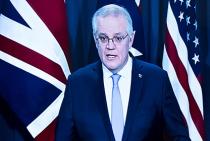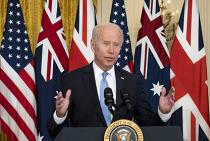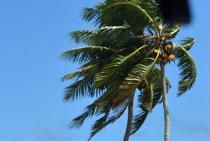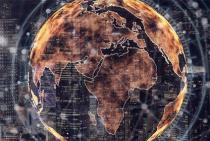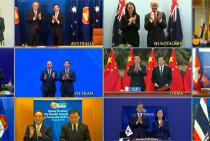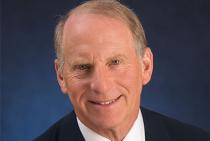New York Times News Analysis: When Scott Morrison became Australia’s prime minister three years ago, he insisted that the country could maintain close ties with China, its largest trading partner, while working with the United States, its main security ally. “Australia doesn’t have to choose,” he said in one of his first foreign policy speeches. On Thursday, Australia effectively chose. Following years of sharply deteriorating relations with Beijing, Australia announced a new defense agreement in which the United States and Britain would help it deploy nuclear-powered submarines, a major advance in Australian military strength.
You are here
Results for International relations
Friday 17 September 2021
 Premium content
Premium content
Sydney, Australia
Friday 17 September 2021
 Premium content
Premium content
Paris, France
New York Times Reporting: President Joe Biden’s announcement of a deal to help Australia deploy nuclear-powered submarines has strained the Western alliance, infuriating France and foreshadowing how the conflicting U.S. and European responses to confrontation with China may redraw the global strategic map. The Biden administration appears to be upping the ante with Beijing by providing a Pacific ally with submarines that are much harder to detect than conventional ones.
Wednesday 18 August 2021
New York, USA
New York Times News Analysis: An era that began two decades ago with the shock of hijacked planes flying into American skyscrapers drew to a close this week with desperate Afghans clinging to American planes as they tried to escape the chaos of Kabul. Some fell; one was found dead in the landing gear. A colossal bipartisan investment of U.S. force, treasure and diplomacy to defeat a hostile ideology bent on the creation of an Islamic Emirate of Afghanistan has failed. Over four presidencies, two Republican and two Democratic, more than 2,400 Americans gave their lives, and more than $1 trillion was spent, for shifting Afghan goals, many of which proved unattainable.
Saturday 10 April 2021
Nuku'alofa, Tonga
The following information is to correct any misinformation regarding the Ministry’s partnership with the Beijing Machinery Repair Company Limited.... Oku tuku atu ‘a e ngaahi fakamatala ko eni koe’uhi ke fakatonutonu ‘a e ngaahi fakamatala hala fekau’aki pea mo e fengaue’aki ‘a e Potungaue pea mo e Beijing Machinery Repair Company Limited.... Media Statement from the Tonga Ministry of Agriculture, Food and Forests (MAFF).
Thursday 8 April 2021
 Premium content
Premium content
New York, USA
New York Times reporting: How does a country deal with climate disasters when it is drowning in debt? Not very well, it turns out. Especially not when a global pandemic clobbers its economy. Take Belize, Fiji and Mozambique. Vastly different countries, they are among dozens of nations at the crossroads of two mounting global crises that are drawing the attention of international financial institutions: climate change and debt.
Wednesday 31 March 2021
 Premium content
Premium content
Brussels, Belgium
New York Times reporting: Citing what they call “the biggest challenge to the global community since the 1940s,” the leaders of more than two dozen countries, the European Union and the World Health Organization on Tuesday floated an international treaty to protect the world from pandemics. The current pandemic is “a stark and painful reminder that nobody is safe until everyone is safe,” the leaders write. The suggested treaty is an acknowledgment that the current system of international health institutions, symbolized by the relatively powerless WHO, a U.N. agency, is inadequate to the problem.
Tuesday 8 December 2020
Cambridge-MA, USA
According to the conventional wisdom, the twenty-first century will be characterized by the global shift from American hegemony to Sino-American rivalry. But a bipolar international order is neither inevitable nor desirable, and in fact, would be deeply unstable. Its emergence would heighten the risk of violent conflict and three of the biggest challenges facing humanity would either be ignored or made worse. We should start imagining and working toward alternative arrangements. - By Daron Acemoglu.
Monday 30 November 2020
 Premium content
Premium content
Geneva, Switzerland
New York Times reporting: An unexpected contest over the 2021 presidency of the U.N. Human Rights Council is pitting some of the United Nations' most powerful member states against tiny Pacific Island nations and is playing out as U.N. members jockey for influence in anticipation of a new, more engaged U.S. administration.
Monday 16 November 2020
Oxford, United Kingdom
The last time the world faced challenges as serious as those facing us now was in the period immediately following World War II. At that time there was an extraordinary burst of international institutional creativity, led by the United States. The late 1940s saw the creation of the IMF, the World Bank, the Marshall Plan, the United Nations, which the WHO joined in 1948, and the GATT, now the WTO. If countries in Asia want a multilateral system to survive, they need to promote, use and improve it. The G20 Summit in Riyadh on 20–21 November will provide an opportunity to push forward this agenda. By David Vines / East Asia Forum.
Monday 16 November 2020
 Premium content
Premium content
Beijing, China
New York Times reporting: After eight years of talks, China and 14 other nations from Japan to New Zealand to Myanmar on Sunday formally signed one of the world’s largest regional free trade agreements, a pact shaped by Beijing partly as a counterweight to U.S. influence in the region.
Thursday 5 November 2020
 Premium content
Premium content
London, United Kingdom
New York Times reporting: An indecisive U.S. presidential election hurtling toward legal challenges transfixed the world Wednesday, with viewers in Europe, Asia and elsewhere riveted by the pitched battle between President Donald Trump and former Vice President Joe Biden and appalled by Trump’s demand to stop counting votes. By Mark Landler and Damien Cave.
Tuesday 3 November 2020
Canberra, Australia
Whoever claims victory in the US presidential contest this week, Washington’s grasp over Asia’s future is on the wane. The world’s confidence in US power and the moral authority it once commanded and the capacity to deploy it are much diminished. Even the most energetic and driven administration won’t restore it easily, soon or perhaps ever. ...The reality is that small and middle powers in Asia now have to play an unfamiliar leadership role. This ominous responsibility will remain long after the 46th President of the United States settles into the White House. By East Asia Forum editors.
Wednesday 2 January 2019
New Delhi, India
America’s decision to abandon the global system it helped build, and then preserve for more than seven decades, marks a turning point, because others lack either the interest or the means to sustain it. The result will be a world that is less free, less prosperous, and less peaceful, for Americans and others alike. By Richard N. Haass.
Saturday 9 May 2015
 Premium content
Premium content
Nuku'alofa, Tonga
Today, 9 May, the European Union is celebrating Europe Day...The European Union has a long standing relationship and friendship with Tonga and other Pacific countries. Our partnership is based on our shared values, on common concerns and on common aspirations. We are keen to work closely with our Pacific partners to tackle global challenges - some challenges are so big that only a global response will suffice to overcome them. – EU Ambassador Andrew Jacobs.


